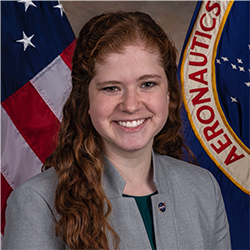
Sarah Demsky
What is your next adventure?
will be starting as a master's student at MIT in September in aerospace engineering. I'll be working as a graduate research assistant in the Laboratory for Aviation in the Environment. I don't know exactly what my projects will be yet, but the lab overall studies how aviation impacts the environment and researches ways to mitigate the industry’s impact on climate change.
Before I start there, I’m interning with the Sandia National Laboratory as a research and development intern working on non-linear mechanics and dynamics projects.
What about your next adventure are you most looking forward to?
I’m excited to be in a new place. I haven’t been to Cambridge, Massachusetts so I’m looking forward to exploring and navigating a new place. My graduate program held a virtual Q and A session a few weeks ago, so it was exciting to meet my future classmates and professors, and learn more about the program.
Did you have any previous co-op, internship, or research experience in this area?
My first internship was at NASA’s Marshall Space Flight Center in Huntsville, Alabama. I spent the summer doing a lot of research and development work that I really liked, so that pushed me more towards the research aspect of aerospace.
On campus I worked on the structures team of the Tethering And Ranging Mission Of The Georgia Institute Of Technology (TARGIT) cubesat mission in the Space Systems Design Lab (SSDL), and I’m currently finishing up my work with Prof. Brian German on an electric vertical takeoff and landing (eVTOL), x-plane project.
Georgia Tech has a lot of different research opportunities, so I was able to explore lots of different projects. After TARGIT, I worked on the OrCa cubesat mission with Prof. Brian Gunter, so those projects went together, but at the same time I was able to transition into the aircraft side of things by working with Prof. German.
I also had research experience through a vertically integrated project (VIP) course I took last semester. We studied COVID modeling, which doesn’t sound aerospace related, but my team specifically analyzed airflow and how COVID could spread through the airflow of buildings.
My team analyzed airflow using computational fluid dynamics (CFD) software to study different scenarios. For instance, if you have a K-12 classroom and someone coughs and no one is wearing a mask, how many people will be affected? What if we use a different air vent layout or HVAC system, how does that change the data? Taking that type of course during a global pandemic isn’t something that happens often, so it was gratifying to help make a difference.
How did your educational experience at Georgia Tech help you to achieve your goals?
My goals definitely shifted a lot from when I first started at Tech. At first all I wanted to study was space. I wanted to finish school in four years and get a job at a cool space company right out of college, but when I started research in the SSDL I realized that there was more that I wanted to do. Through my research with SSDL I was able to get more experience and get internship opportunities, which shifted my goals from going straight into industry after graduation, to continuing my education and diving deeper into research.
What advice would you give to an underclassman who would like to follow the same path?
I would say don't close off your mind to other opportunities, even if you think you have your mind set on something. You should try other things to make sure that that's what you want to do and explore. For anyone that wants to follow a similar path to graduate school, I would say definitely get involved in enough research to make you well-rounded, but not too much where you're scattering yourself.
It’s okay to do research in an area that might not necessarily be exactly what you want to do, because you'll gain skills along the way that will lead you to different research, which may lead you to another research project, and will overall build up your arsenal of tools for later on. The research I’m doing in grad school is not that similar to what I’ve been doing here at Tech, but from all the experiences I’ve had it shows that I can adapt and I can pick up things, which is important in graduate school.